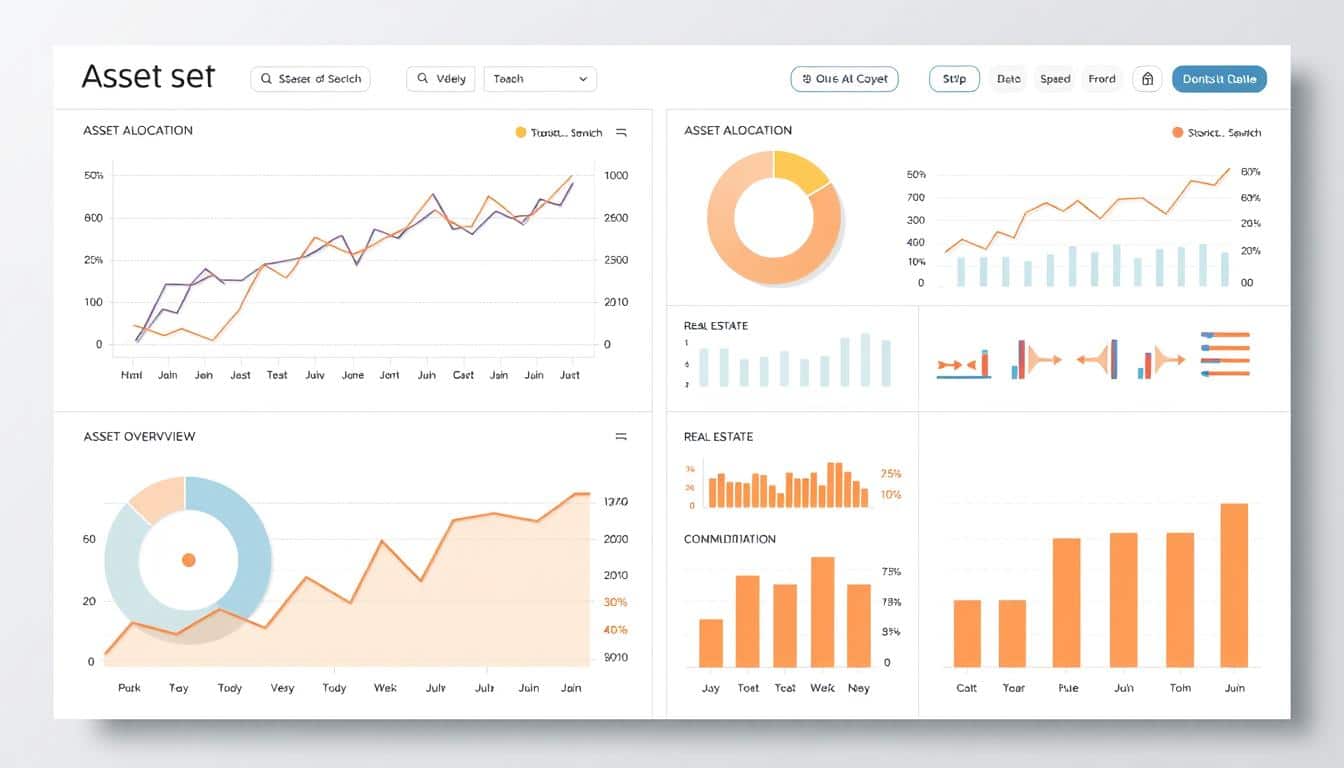In today’s fast-paced world, understanding financial literacy is key. It helps you manage money well and reach your finance goals. Learning how to budget can make you confident with your money. This article will guide you through important ideas and skills to improve your financial wisdom and secure a stable future.
Understanding Financial Literacy
Financial literacy is key in today’s complex world of finance. It helps people understand and manage their money better. Knowing about budgeting, saving, and investing is part of this. These skills are critical for financial freedom and smart choices.
Anúncios
Definition of Financial Literacy
Financial literacy means knowing how to manage your money, including investing. It involves understanding how money grows over time and how to handle debt. With this knowledge, people can better control their finances and secure their future.
Why Financial Literacy Matters
Understanding financial literacy helps people make wise money decisions. Those who know more about finance tend to save for emergencies and retire comfortably. They can also face financial challenges better. This knowledge is crucial as old pension plans disappear, opening up new investment chances for a stable financial life.

The Importance of Budgeting
Budgeting is key for anyone wanting to meet their financial goals. It lets you see your money’s in and out, helping you stay in charge of your finances. Budgeting lets you spot where your money goes, pay for what you need, and save for the future.
Creating a Personal Budget
A personal budget acts like a map for handling your money. You start by figuring out your monthly income and sorting your expenses into what you need and what you want. Here are steps to build your budget:
- Find out your total monthly income from all places.
- Sort your expenses into groups like home, food, travel, and fun.
- Set spending caps for each group, keeping your money goals in mind.
- Check and tweak your budget often, especially when your money situation changes.
Being able to change your budget when needed is important. This makes sure it fits your current money situation.
Tracking Your Income and Expenses
Keeping an eye on what you earn and spend is a big part of having a good budget. Watching your money helps you see when you’re spending more than you planned. Tools and apps for budgeting can make it easier to follow your money. Here’s why they’re helpful:
- They update your budget for you after you buy something.
- They show your money data in pictures, so trends are easy to see.
- They warn you if you’re spending too much in one area.
By watching your money closely, you can make changes quickly. This helps you keep your spending in line with your big financial goals.
Building a Strong Financial Foundation
Creating a solid financial base is key for lasting wealth and stability. Knowing the main parts of personal finance helps manage money well. With this knowledge, people can build plans to save more and learn more about finances.
Key Components of Personal Finance
Important parts of personal finance include:
- Budgeting: Making and keeping a budget helps keep track of what you earn and spend.
- Saving: A strong savings plan is crucial for financial safety and readying for surprises.
- Investing: Putting money into things that grow in value over time helps build wealth.
- Insurance: Getting the right insurance covers protects your things and money from risks.
Understanding the Time Value of Money
The concept of the time value of money shows money today can become more in the future. This is because you can invest it and make it grow. This idea stresses the importance of saving and investing early.
For instance, investing now can greatly increase your wealth later. Knowing about the time value of money helps people make smarter choices with their savings and investments.
Effective Saving Strategies
Learning how to save effectively is key to financial well-being. At the heart of this is having a fund for emergencies. This safety net gives you peace of mind when unexpected things happen. Also, knowing the perks of a savings account can make your financial health better.
How to Build an Emergency Fund
For a solid emergency fund, save three to six months’ worth of living costs in a special, easy-to-get-to account. Begin by saving a bit of your income regularly. Doing this steadily builds a safety buffer for surprises like losing your job or sudden health issues.
The Importance of Savings Account
A savings account is vital for your finances. It keeps your money available in the short term and helps it grow through interest. With money in a savings account, you can handle emergencies without leaning on expensive debt. This way, you stay financially secure, even when times are tough.
Introduction to Credit Management
Managing your credit well is key to your personal finance health. It helps you understand and keep up your credit scores. Your credit score is like a scorecard, showing how well you handle money. It affects if you can get loans and the interest you pay.
Learning what makes up your credit score is the first step. This knowledge helps you manage your credit better.
Understanding Credit Scores
Your credit score comes from things like your payment history and how much of your credit you are using. It also looks at how long you’ve had credit, any new credit checks, and the types of credit you use. Keeping an eye on your credit score is vital. It helps you get better loan rates and terms.
Knowing your credit score lets you make smart money choices. It’s a big part of managing your credit well.
How to Improve Your Credit Score
To make your credit score better, you need a good plan. Here are some important steps to take:
- Always pay your bills on time.
- Keep your credit card balances low.
- Use different kinds of credit, like credit cards and loans.
- Don’t ask for too many new credits; it can lower your score.
- Check your credit report often to fix mistakes.
Following these steps will help grow a stronger credit profile. This will make your credit score better over time.
Investing Basics for Beginners
Learning the basics of investing is key for anyone wanting to increase their money over time. There are many types of investments, each with their own features that affect your decisions and results. Knowing about these can make you better at deciding and building a strong financial future.
Types of Investment Vehicles
Beginners should get to know the common types of investments, like:
- Stocks: Owning a part of a company, could bring high earnings but with more risk.
- Bonds: Lending money to companies or governments, usually safer with fixed interest returns.
- Mutual Funds: Investing together with others without needing to pick each stock yourself.
- Real Estate: Owning property, might earn money through rent and increase in value.
Understanding the risks and benefits of each option is important for smart investing.
Building an Investment Portfolio
Diversifying your investments is critical for managing risk. Beginners need to think about their comfort with risk and how long they plan to invest. This helps in spreading investments to achieve a balance. Some methods include:
- Having clear financial goals to shape your investment choices.
- Investing in various types of assets.
- Checking and adjusting your investments to keep the risk you want.
Understanding Loans and Debt Management
Loans have different purposes and knowing the types helps make smart financial choices. Each kind of loan has its own interest rates, how to pay it back, and rules. It’s key to manage debt well for money health. Good debt management plans are crucial.
Types of Loans
Here are some loans people often use:
- Student Loans: These help pay for school costs.
- Auto Loans: Used to buy cars.
- Mortgages: For purchasing homes, usually paid back over many years.
- Personal Loans: These don’t need collateral and cover various personal needs.
Knowing about these loans helps in making wiser choices when you need to borrow.
Strategies for Managing Debt
To manage debt well, you can use some smart strategies. Here are some:
- Prioritizing High-Interest Debts: Pay off the most expensive debts first.
- Timely Payments: Always pay on time to skip extra fees.
- Consolidating Loans: Merging loans could get you a lower interest rate.
- Setting Up a Repayment Plan: Have a plan to pay back what you owe systematically.
Using these strategies can make a big difference in handling debt better.
Tax Literacy: What You Need to Know
Tax literacy is key to getting the basics of the tax system. It helps you make better money decisions. Knowing how taxes work prepares you for financial duties and helps you save on taxes. Learning about income tax brackets, what counts as taxable income, and how withholding works can keep more money with you at year’s end.
Basics of the Tax System
Knowing how the tax system works is crucial for smart financial planning. Here are the basics:
- Income tax brackets show the tax rate for different income levels.
- Taxable income affects how much tax you pay.
- Tax withholding means taking taxes out of your paycheck ahead of time.
Many don’t see the perks of filing taxes if it’s not required. But filing can lead to refunds and credits you’d miss otherwise.
Tax Deductions and Credits Explained
It’s important to know how tax deductions and credits differ. Deductions lower your taxable income, so you pay tax on less money. Common deductions are for student loan interest, mortgage interest, and certain medical costs.
Tax credits lower your tax bill directly, dollar for dollar. Credits for things like education or child care bring big savings. Getting to know these can boost your tax knowledge and help you make smarter money moves.
Smart Spending Habits
Learning how to spend wisely is key to better money health. It’s important to know the difference between what you need and what you want. This helps you build a budget that really works. By figuring out what’s essential and what’s not, you can make smarter choices. These choices help manage your finances well.
Identifying Needs vs. Wants
The difference between needs and wants affects how your money grows. Needs are things you must have to live, like:
- Housing costs
- Food and groceries
- Healthcare and insurance
Wants are things you enjoy but don’t need for survival. Examples include:
- Dining out
- Designer clothing
- Latest gadgets
Make shopping lists and budget for fun stuff to control your spending. Revisiting your needs and wants helps keep your finances healthy.
The Impact of Impulse Buying
Buying on a whim can hurt your savings and financial plans. These buys, often based on feelings or ads, can add up. They put a strain on your budget. Knowing why you make these purchases helps you avoid them.
- Pacing oneself in shopping areas to avoid temptation
- Setting a rule for a waiting period before making non-essential purchases
- Using cash instead of cards for discretionary spending
Controlling your spending by knowing what’s a need and what’s a want. This is crucial for handling your money better. It helps you reach your financial dreams.
Financial Literacy Resources and Tools
Finding the right tools for money management can greatly improve how you handle finances. There are many aids available, like online courses and budgeting apps, to help anyone with their money matters. They fit different needs, so finding a good way to learn about finances is easier for everyone.
Online Courses and Workshops
Many online platforms offer courses on important financial topics. Topics include budgeting, investing, and how to manage debt. These courses let you learn at your own speed, which is perfect for those with tight schedules. Websites like Coursera, Udemy, and Khan Academy are among the top picks. They offer a vast amount of knowledge for anyone looking to get savvy about personal finance.
Mobile Apps for Budgeting
Mobile apps have changed how we handle our money. Apps such as Mint, YNAB (You Need A Budget), and PocketGuard help with budgeting by tracking spending automatically. They simplify financial planning and encourage good spending habits. By using these apps, people can get better at managing their finances day by day.
How to Set Financial Goals
Setting clear financial goals is a key step in managing your money well. It helps you organize your budget and guide your spending. Knowing the difference between short-term and long-term goals is also crucial. This knowledge helps you build a well-rounded financial plan.
Short-Term vs. Long-Term Goals
Short-term goals are about your immediate needs and wants. Examples include:
- Saving for a vacation
- Buying a new gadget
- Establishing an emergency fund
On the other hand, long-term goals are about your dreams for the future that need ongoing effort. These may include:
- Saving for retirement
- Purchasing a home
- Funding children’s education
Having both types of goals makes your finances stronger.
Creating a Financial Action Plan
Creating a good action plan is about laying out steps to reach your goals. It includes:
- Budgeting methods that match your goals
- Setting exact saving targets
- Establishing timelines for achieving milestones
This plan keeps you focused and responsible in chasing your financial dreams.
Conclusion
As we wrap up this guide, remember that knowing about money is key for smart financial choices. Learning from this guide helps you handle your money well.
Knowing how to budget, invest, and manage debt is crucial for reaching your money goals. It helps you make wise choices and secure your future.
Keep learning and use what you’ve learned to improve your finances. Start now to take control of your financial journey and build a stable future.
FAQ
What is financial literacy?
Why is financial literacy important?
How can I create a personal budget?
What tools can help me track my income and expenses?
What are the key components of personal finance?
Why is it important to understand the time value of money?
How can I build an emergency fund?
What role does a savings account play in my financial plan?
How do credit scores work?
What steps can I take to improve my credit score?
What are common types of investment vehicles?
How can I build a diversified investment portfolio?
What types of loans should I be aware of?
What strategies can I use to manage my debt effectively?
How does the tax system work?
What are tax deductions and credits?
How can I differentiate between needs and wants?
What is the impact of impulse buying on finances?
Where can I find financial literacy resources?
What mobile apps can help with budgeting?
How do I set short-term and long-term financial goals?
What is a financial action plan?
Conteúdo criado com auxílio de Inteligência Artificial



